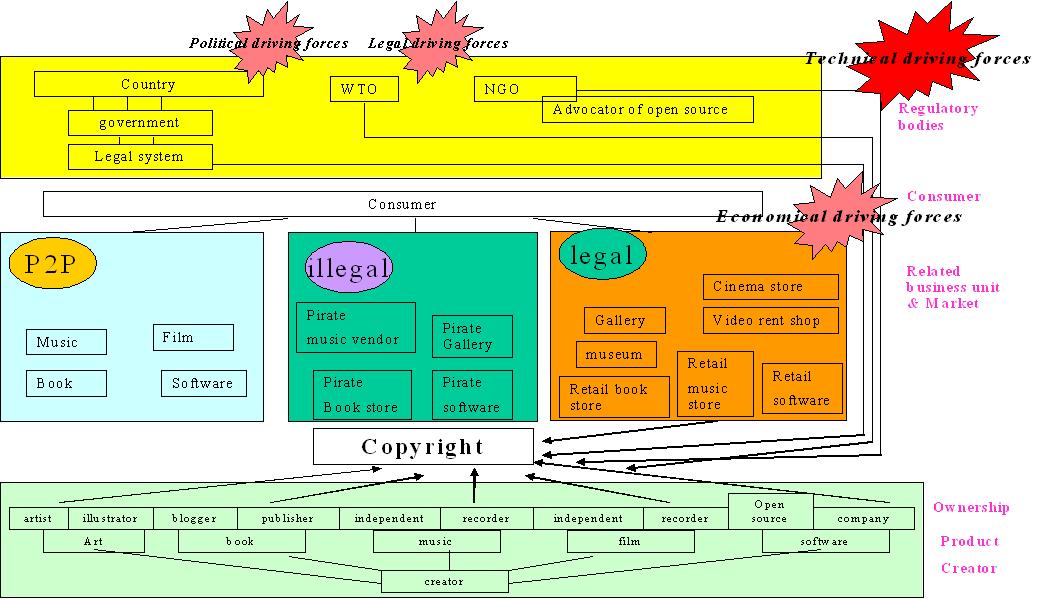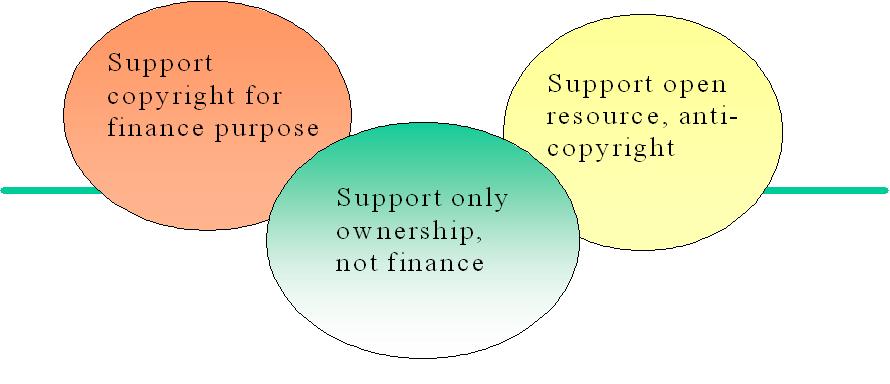Difference between revisions of "Future of Copyright"
Colorcanfly (talk | contribs) |
|||
| Line 90: | Line 90: | ||
== '''Scenarios''' == | == '''Scenarios''' == | ||
==Scenario 1: Economic driving forces shape the future of copyright== | ==Scenario 1: Economic driving forces shape the future of copyright== | ||
''Scenario 1: A future where economic driving forces shape the future of copyright'' | |||
The rapid pace of technological development means that it has become one of the key drivers in shaping copyright issues. However, it is the economic implications of the technology that is the catalyst for ascertaining whether the technology endangers or liberates copyright issues. It may be evidenced through a reduction in product market share or sales, or may even call for a redesign in existing business models. Legal driving forces become a major issue when financial and economic questions are raised regarding copyright. In theory, the law is implemented to protect firms and individuals from financial and intellectual property losses. However, the interpretation of this law is varied and contingent on many factors, primarily the nature of the copyright violation, | |||
In some instances, the increase in illegal P2P sharing of information – music, film and general “theft” of intellectual property from artists, creators and corporations alike has prompted a backlash from those parties and is at least partly responsible for an economic downturn due to a loss of revenues. Big media firms such as TimeWarner, Sony and Bertelsmann are threatening to take their case to the International Criminal Court in The Hague. | |||
In an effort to boost the economy, political driving forces adopt the copyright issue and the government becomes involved. Re-categorized as a “national” as opposed to purely economic issue, the government claims that the protection of a nation's intellectual property - be it artistic, technological or simply procedural - is paramount. Moreover, if citizens steal information from sources internally, they are stealing from their own. It becomes a major campaign issue for politicians around the world. Governments institute the following mandates with regard to information transfer: | |||
1. Greater laws to prevent copyright theft | |||
2. Strict enforcement of these laws – violators subjected to imprisonment | |||
3. Legal systems amended to ensures greater financial rewards to creators of content | |||
4. Media is given a greater platform to promote original content | |||
5. New systems implemented to educate public on theft of software | |||
==Scenario 2: Free driving forces shape the future of copyright== | ==Scenario 2: Free driving forces shape the future of copyright== | ||
Revision as of 16:05, 31 May 2006
Introduction
The concept of copyright is not new. It is an old concept that continues to be applied to multiple products within multiple industries within our modern society. As advances in technology have transpired, so have the economic and political ideologies that seek to protect, apply and enforce the concept of copyright.
Since the concept of copyright is so versatile, the implications of the term have changed over time. So much so, that common notions of what constitutes copyright is highly conditional on the individual. In fact, the entire concept of copyright has different meanings to different individuals.
Our intention with this Scenario Planning exercise is to define copyright in broad terms, and then specifically illustrate how the Internet and World Wide Web have changed the implications of copyright within the media industries: audio, video, and publishing. We will examine the technological, economic and political driving forces that facilitate or hinder these changes, and also the legal and social implications for society.
. Great research! I llike that you have taken the time to understand and think through the issues. GOOD STUFF! . The systems diagram have organised the forces in terms of hierarchies, and not systems. Remember that issues link with each other irrespective of how they are best organised. Politcal issues drive social issues, and economic issues etc, Look at the systems diagra of the the MashUp group or the group working on the creation of software. . great work, good luck, look forward to seeing you next week!
Group members
We are presently MBA candidates at the Universiteit van Amsterdam Business School. Our group consists of Ching-Heng Wu, Hui-Fei Yen, and Vijay Kalappa.
Research questions
2. What is Intellectual Property?
6. what behavior of users would cause the copyright infringement of software?
7. What is the effect of copyright infringement on digital culture?
8. What is the DRM and what is its aim?
9. Is there any DRM implementations? Give examples
10.How long would Copyright last ?
11. Is there anyone to oppose the copyright? What are their arguments?
16. Is it possible to preserve or protect copyright by using technology skill?
17. What is the original of copyright?
Driving forces of copyright
Description:
We have identified four major driving forces: technological, economic, legal and political. In our present society, the rapid pace of technological development means that it is the most obvious driving force for copyright issues. This subsequently prompts economic driving forces to come into play. The economic implications of the technology will ascertain whether the technology endangers or liberates copyright issues. It may be evidenced through a reduction in product marketshare or sales, or may even call for a redesign in existing business models. Legal driving forces become a major issue when financial and economic questions are raised regarding copyright. In theory, the law is implemented to protect firms and individuals from financial and intellectual property losses. However, the interpretation of this law is varied and contingent on many factors: nature of the copyright issue, medium, parties involved and importantly, although indirectly, any political driving forces. Protection of a nation's intellectual property - be it artistic, technological or simply procedural - is a serious issue. It applies equally to individuals or corporations alike.
Driving forces analysis:
Copyright: Technological Driving Forces
Copyright: Economic Driving Forces
Copyright: Legal Driving Forces
Copyright: Political Driving Forces
Systemetic diagram
Identify all players
(graph ...Jo)


Three different type of attitudes toward copyright
1.Support copyright for economic purposes:
(Vijay)
2.Support copyright for ownership and not economics: (Ruby)
3.Support open resource platforms, no copyright needed: (Jo)
Scenarios
Scenario 1: Economic driving forces shape the future of copyright
Scenario 1: A future where economic driving forces shape the future of copyright
The rapid pace of technological development means that it has become one of the key drivers in shaping copyright issues. However, it is the economic implications of the technology that is the catalyst for ascertaining whether the technology endangers or liberates copyright issues. It may be evidenced through a reduction in product market share or sales, or may even call for a redesign in existing business models. Legal driving forces become a major issue when financial and economic questions are raised regarding copyright. In theory, the law is implemented to protect firms and individuals from financial and intellectual property losses. However, the interpretation of this law is varied and contingent on many factors, primarily the nature of the copyright violation,
In some instances, the increase in illegal P2P sharing of information – music, film and general “theft” of intellectual property from artists, creators and corporations alike has prompted a backlash from those parties and is at least partly responsible for an economic downturn due to a loss of revenues. Big media firms such as TimeWarner, Sony and Bertelsmann are threatening to take their case to the International Criminal Court in The Hague.
In an effort to boost the economy, political driving forces adopt the copyright issue and the government becomes involved. Re-categorized as a “national” as opposed to purely economic issue, the government claims that the protection of a nation's intellectual property - be it artistic, technological or simply procedural - is paramount. Moreover, if citizens steal information from sources internally, they are stealing from their own. It becomes a major campaign issue for politicians around the world. Governments institute the following mandates with regard to information transfer:
1. Greater laws to prevent copyright theft 2. Strict enforcement of these laws – violators subjected to imprisonment 3. Legal systems amended to ensures greater financial rewards to creators of content 4. Media is given a greater platform to promote original content 5. New systems implemented to educate public on theft of software
Scenario 2: Free driving forces shape the future of copyright
Scenario 3: An amalgamation of driving forces shape the future of copyright
There is a whole new world.
Back graound
Assumption1: Economic driven force failed because they can't catch the technology development and make the law immedietely to stop pirate products or illegal download. There is always a surprise on the new technology innovations. There is always time lag to lobby and force the government making the new law.
In short, this is an incredibly long-term war! The company not only invest a lot of money on making the rules but also spend huge money to conduct law suit. Although at the first 10 years, coporations have economic power to do all these better than the idividual consumer or NGO. However, as their sales go dwon year by year, and the profit margin decrease day by day, these company are run out of their energy and money to protect their copy right and to punish others. Therefore, they are stop attacking others. In the end, theses company are either surrender or totally die and disapear. Only the smarter suvivers come into this senario 3!